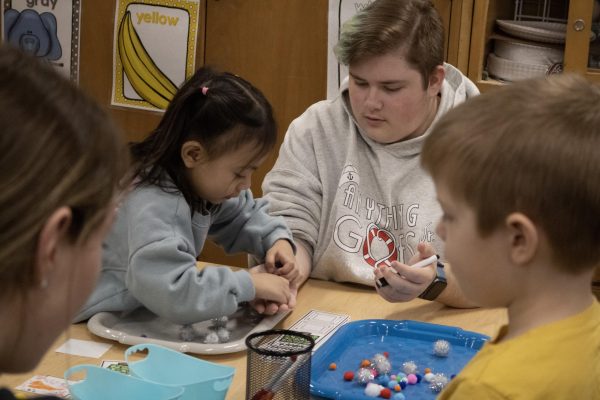Heroin: the underground narcotic of the North Shore
Heroin use in the United States has increased by 63 percent in the past 11 years, according to an article published by Time. To some, the problem may seem distant, maybe even irrelevant. However, to other members of the community— including South students— heroin addiction hits close to home as friends and family members are impacted by the drug.
December 18, 2015
Chicago has had the number one highest heroin problem in the country for the past fifteen years, and the numbers just keep growing, according to alcohol and drug counselor PJ Newberg. Outside of the city, the suburbs constantly struggle with drug problems, and the North Shore has more recently become a victim of the drug according to Newberg, the mother of Paula Nixon, a recovering heroin addict that graduated from Glenbrook South. Newberg has witnessed many lives being lost to the heroin addiction, but believes the problem is still hidden within our community.
“I equate this drug with the devil because it basically steals your soul, your family, your ambition,” Newberg said. “Anything positive in your life it takes away. The North Shore continues to want to hide the problem, and it’s especially Glenview.”
Although it may not always be openly talked about, the issue is more present than ever, according to junior Kenny McMahon. Having watched his best friend suffer through heroin addiction, McMahon is very knowledgeable about the drug and understands how dangerous it truly is.
“It’s scary to see a substance that people can put off as harmless and fun, it just completely takes over,” McMahon said. “It’s a scary thought to see something just grab control of someone else’s life and and you can’t get away from it any time soon. 80 percent of heroin addicts relapse, and you’re seeing it more and more around here. He was a very good friend of mine, and seeing him struggle with it, not only the physical withdrawal symptoms- the headaches the fevers, the nausea- but he wasn’t himself. He was always fatigued and then the psychosis, the depression, the suicide attempts, even though I’m not the one going through it, it’s still tough to watch someone you care about going through that and trying to harm themselves all because of this drug that was offered to him at a party.”
Having endured seeing her own daughter struggle with an addiction to heroin, Newberg has been deeply affected by the devastation the drug causes and has devoted her life to educating others and raising much-needed awareness within the schools of our community and surrounding areas.
“My whole goal is just to talk about it and get the message out there,” Newberg said. “Kids are the ones that need to hear this. Parents too, but kids needs to learn about the drug. In Illinois and around the country there is no drug education about heroin in schools. That’s a serious problem if they don’t know not to do it or they don’t know anything about the drug.”
McMahon believes that in the North Shore area as a whole, many people get so caught up with their own reputations and self-image that they are unable to admit when they have a problem. He notes that parents are often the main sources of this issue because they turn their backs to problems within their own children that are right in front of them.
“People are afraid to get help because they think they will get looked at a certain way,” McMahon said. “People in the North Shore, especially parents, are afraid of their reputations and let their egos get in the way because other people might see them as poor parents. I think that’s a serious problem, that people are so selfish as to put their egos ahead of the nature of their children.”
Senior Michelle Kruger* grew up witnessing the harmful effects heroin has on the addict and everyone that surrounds them. Having a brother that grew up with a heroin problem, Kruger explained how she was forced to watch him struggle and deal with his addiction. Although this was a very difficult experience, Kruger believes that it has made her a stronger person today.
“[My brother] has always had some struggles with addictions and drug issues, but I think it was so weird for me because it was always obvious when there was a problem, but for a long time it wasn’t talked about because I was so young,” Kruger said. “As I got older it became more apparent. Now I am 18 and around all that, so it’s way easier for me to detect warning signs of not only heroin, but dealing with all kinds of drugs. I can tell if someone is on [drugs] because I have had so many different experiences that have given me a different background.”
Because heroin took control of his life, Kruger often felt distant from her older brother and noticed negative changes in their relationship whenever he was using heroin. Kruger explained how he did have a problem, but has always looked up to her brother regardless and still remains close to him to this day.
“…Up until a few years ago, [his addiction] has never really stopped,” Kruger said. “The weird thing is that it kind of became normal. If there was [a problem] I wasn’t really surprised because I had just become accustomed to it. I guess I did look at my brother differently. He’s my older brother, so I definitely looked up to him in a lot of ways. We’re so close, but I feel like his addiction with multiple drugs including heroin took a toll on our relationship. During the time that he was at his worst, we also were.”
Along with Kruger’s older brother, Newberg continues to watch her daughter suffer with her addiction to this day. Nixon’s life has been controlled by heroin since high school, and she has been unable to find stability throughout it all. Newberg will never lose hope for her daughter and believes that one day she will be able to escape from the clutches of heroin.
“I’ve seen too many people die,” Newberg said. “I can’t even describe what my daughter has gone through. Five and a half years later she has been in fifteen treatment centers. She’s been in jail. She’s lived on the street. She’s my only family, my only child, and it just kills me to watch her struggle. It’s just a horrible drug, and she’s still fighting it. She’ll do well for a while, but I’ll never lose hope for her.”
According to McMahon, he has not been able to maintain a close relationship with his friend due to the destructive nature of heroin. Although he has been struggling to regain control of his life, McMahon believes that his friend is now clean and on the road to recovery.
“He was clean for a while and then it’s been a while since I talked to him because we went separate ways,” McMahon said. “Last time I talked to him was a couple months ago, and he was clean. I think that’s a miracle because it’s so difficult, opiates especially. They’re so much more severe than most drugs because they’re harder to get away from.”
Both McMahon and Kruger have experienced the life-altering effects heroin can have on an individual, so they urge others to look inside themselves, admit they have a problem, and seek help. If not conquered early on, assistance may be needed, which then may be the only way to overcome an addiction to a drug as insidious as heroin.
“I think the most important thing for someone struggling with this problem is to be honest with yourself and really focus on what you want,” Kruger said. “Also be realistic because it’s really hard, especially with heroin. It’s not like cigarettes after a certain amount of time you need assistance, that that’s okay. It doesn’t mean the person is weak, but sometimes you need to get help and stick with it.”













